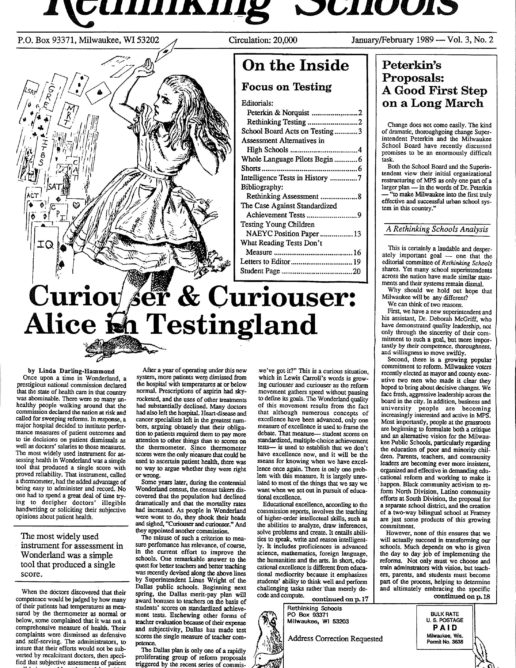It’s Time to Rethink Standardized Testing
Two years ago in an issue focusing on eating we critiqued the growing national obsession with standardized tests that is increasingly determining how students experience schools.
Even though this “testing explosion” has continued to engulf much of the nation we see reason for hope. Throughout our country respected educators and organizations, such as the National Association for the Education of Young Children, have raised substantive criticisms of standardized tests. Some state legislatures – in North Carolina, Arizona and Mississippi, for example – have listened and have limited or banned standardized tests in early childhood education.
We hope that this issue of Rethinking Schools will help strengthen this movement against the overuse and misuse of standardized testing, and encourage efforts in Milwaukee and Wisconsin to limit the damage such testing causes our children.
As Robert Lowe explains in this issue the historic roots of standardized testing are less than noble. Seeking to sort people along class and racial line in order to maintain class privilege, social scientists developed multiple choice standardized tests in the early 1900’s.
As standardized tests became more widely used, respected, and sophisticated, their intrinsic drawbacks remained unremedied. In her article, ”The Case Against Standardized Achievement Tests,” Terry Meier argues that such tests are tainted by cultural bias and an inherent in capacity to measure important cognitive and affective abilities. These weaknesses remain intractable features of standardized tests despite the well-intentioned efforts of test constructors.
Some enlightened school leaders who recognize the shortcomings of standardized tests argue that until we have workable alternatives we must keep using standardized tests. And yet alternative forms of assessment do exist – although they are not as neat and tidy as the reductionist “single number” models that most school systems have been wedded to. David Levine in his article, “Assessment Alternatives in the High Schools,” examines three’ schools in which innovative forms of assessment are being used. Relying both on his own investigative reporting and on the recently published monograph, Beyond Standardized Testing, by Fred Newmann and Doug Archbald, Levine explains the use of several types of alternative forms of assessment which put emphasis on what students actually can do, rather than how well they fill in bubbles on sheets of paper. We should point out that while Levine examined alternative forms of assessment employed by individual schools, whole school districts, such as Baltimore, and whole states, such as Vermont, are beginning to experiment with new forms of assessment.
Our bibliography for this issue, entitled “Rethinking Assessment” clearly indicates the rich variety of alternative approaches available to schools and school systems who want to rework their assessment program.
In Milwaukee last month we saw a positive sign that school officials might initiate a critical look at the use of stan dardized tests. The Instruction and Com munity Relations Committee of the School Board held a hearing on testing and then established an “Assessment Taskforce on Standardized Testing” that will both critique the current role of testing in MPS and examine alternative forms of assessment.
The taskforce is being created as the system embarks upon what Superintendent Peterkin has termed an effort to “reassess and retool” the entire MPS curriculum. We hope this process will lead to a serious examination of how learning happens in our schools and how teaching and assessment interact with each other. And we hope that such an examination turns a critical eye on current efforts, championed both by officials within MPS and the state Department of Public Instruction, to replace standardized norm referenced tests with equally dangerous standardized criterion referenced tests.
On the state level we are pleased that several legislators have indicated willingness to initiate state legislation to prohibit the use of group standardized tests in kindergarten through second grade. While this will undoubtedly draw criticism from the more traditional minded educators and DPI officials, we believe it is time that professional organizations, parents and advocates for children organize around this important issue. Wisconsin – the home of the first kindergarten in the United States and proud advocate of progressive education – should ban the standardized testing that our four through seven year old children are now inappropriately subjected to.
Finally, we believe the current state legislation that deals with early childhood programs and the ”P-5″ project should be amended so that standardized tests – whether norm-referenced or criterion-referenced – don’t drive the curriculum.
We recognize that the battle against standardized testing will not be an easy one. However, it is necessary. Assessment of students’ progress – whether done poorly through standardized tests or well through more comprehensive forms of assessment – directly affects and in many ways “drives” the curriculum. Those of us who are concerned about the future of our schools and our children must be con cerned about the nature of testing and assessment.

